Can Cats Sense Snakes [Yes, And Here’s What They Do]
Many people are curious as to whether cats can sense snakes, mostly because cats might be a useful ally in preventing snakes from coming near your property. Cats have certainly developed evolutionary adaptations for successfully hunting and killing their prey.
Cats can sense snakes even if they cannot see them. Cats hunt and kill snakes for fun and for food. They are highly efficient predators, and they can sense movement even in low light conditions. They have acute senses of smell and hearing and possess whiskers that enhance their sense of touch.
Cats and snakes can be considered natural enemies as well as competitors.
They are enemies because they can prey on each other, and they are competitors because they eat a lot of the same prey and food items in nature.
Snakes and cats can also kill each other even if the purpose is not to consume the other.
It is helpful to know if your cat senses a snake, especially a venomous one, and assist you in avoiding unfortunate encounters with snakes.
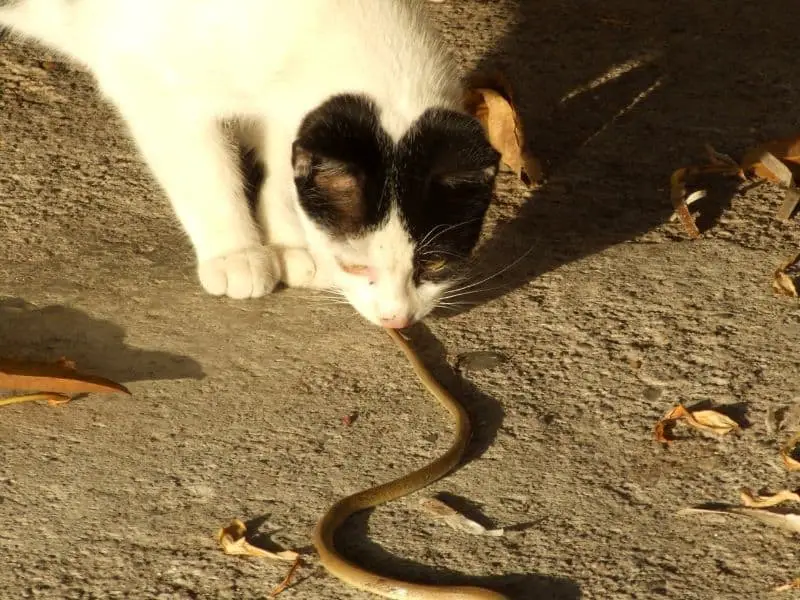
The Acute Senses of Cats
Cats can sense the presence of snakes much better and earlier than people can.
They have a keener sense of their surroundings than humans do, and some say that they can even sense non-physical things that are out of reach for us.
Even without seeing the snake, they can sense it. They have certain sense adaptations that make them highly efficient hunters and predators.
They have a much better sense of smell and hearing, and they possess long whiskers in many parts of their bodies that give them an enhanced sense of touch.
The relationship between cats and snakes
Both cats and snakes are efficient and natural predators and hunters. Cats usually make an extra effort to hunt prey. Even most indoor and domesticated cats still have the instinct to hunt mice as well as snakes around your home.
Related Post: What to Pour Down a Snake Hole
Are Cats and Snakes Natural Enemies?
Cats and snakes can be considered enemies because they actually prey on each other and also compete for the same type of prey.
Cats are curious by nature and are naturally efficient at catching and hunting their prey, which includes rodents like squirrels, rats, mice, as well as birds. Meanwhile, snakes also eat most of these same prey.
In addition, snakes are also known to consume other prey items including insects, frogs, eggs, other snakes, lizards, and earthworms.
Do Cats and Snakes Eat Each Other?
Snakes do eat cats and cats also eat snakes. Larger species of snakes, for example, such as pythons, anacondas, and boa constrictors, whose bodies and mouths can readily accommodate the size of cats, eat them.
These snakes, when big enough, can eat anything up to the size of sheep, goats, and even antelopes.
Conversely, cats easily become curious of the sudden and slithering movements of snakes, which trigger their innate hunting instinct.
Cats are naturally fond of chasing, hunting, and killing anything that wriggles and slithers; snakes fit this description perfectly.
A snake that is struggling to flee or sneak away will make a cat even more excited to pounce on it and kill it.
However, even if cats are natural enemies of snakes, the presence of the former will not necessarily mean that the latter will stay out of the area.
Snakes will still frequent a place if it has lots of frogs, rodents, and other prey items, and if it offers an excellent shelter and ideal habitat.
Are cats and snakes afraid of each other?
Cats will unlikely be scared of a snake especially if it still has no previous encounter with one.
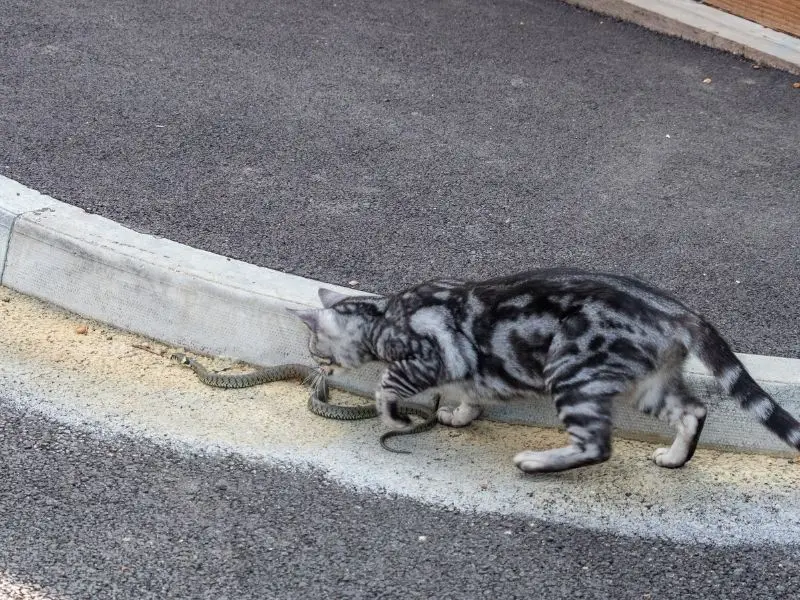
Cats’ curious nature make them stalk, pounce on, and kill any wriggling and crawling creatures such as snakes.
They even consider them as gifts to their human owners, bringing dead snakes back to the house as an offering.
On the other hand, snakes are easily frightened by cats, trying to avoid them as much as possible.
An attacking cat that offers them no escape will cause snakes to defend themselves by hissing, shaking their tail, rearing themselves up, striking, and biting.
Cats can frighten many snakes due to felines’ ability to strike and move quickly, with dangerously sharp claws which can easily shred a snake to ribbons and their large size compared to the majority of snake species, especially the non-venomous types present in your the backyard and in grasslands.
It is possible to deter a snake from a particular area by using the smell of the urine of cats, in the same manner that rodents are deterred by the pungent smell of snakes’ excretion.
How Cats Hunt Snakes
Cats deal with snakes by pawing at them and attacking them with their sharp slashing and piercing claws. As the snake retaliates by striking at the cat, the feline will respond by batting on its head and pouncing on it.
It then grabs the serpent on the head using its mouth, and as it bites the snake, it twists and breaks its neck, which causes paralysis and death to the snake.
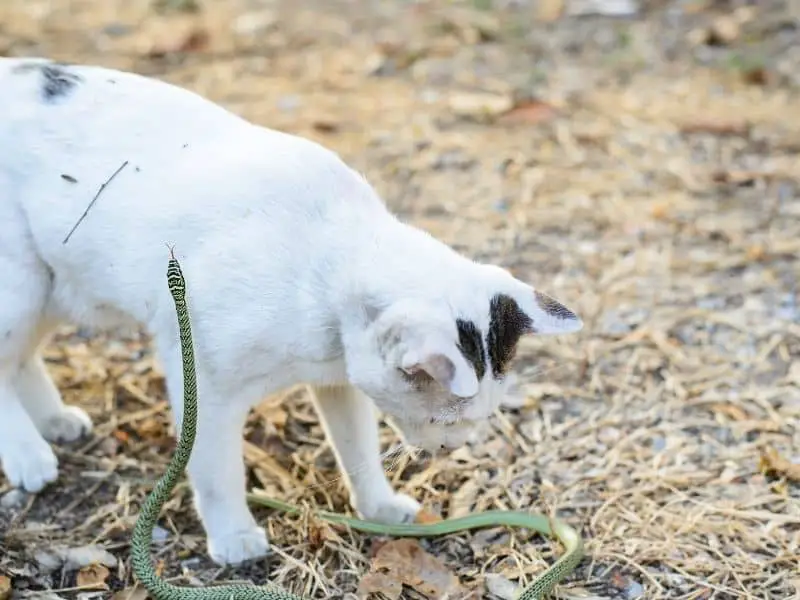
Afterward, the cat may then drag off the body and toy with it. It can also opt to eat it, although cats sometimes don’t eat the entire body.
They may only chew and nibble on the body and leave the rest. It may afterward bring the remaining carcass home as a gift to its human owner.
Cats have a certain hunting technique that is successful in catching a snake and is difficult for a snake to avoid or escape from. Cats stay down to the ground while approaching the snake stealthily, which snakes sometimes cannot detect.
The perils of dealing with snakes
Even if cats may not be afraid of snakes and will actively hunt one, they can nevertheless get in serious danger upon confrontation with snakes and dealing with them.
Large snakes can eat cats.
Although anacondas, pythons, and boas are not naturally present in the US, there are nonetheless many hobbyists who bring these animals into the country.
Once these snakes are in their households, it becomes much more likely for cats to encounter them, especially if they are located in a neighbor’s home.
Snakes can and do bite cats, which can cause serious injury. Even while cats can aggressively pursue snakes, when cornered, annoyed, or provoked, snakes also fight back.
Snakebites, whether from a venomous species or not, can cause wounds, infection, and other medical complications for cats.
When bitten by a venomous snake, the venom can easily kill a cat. This can occur within just a few minutes, especially if the volume of the injected venom is large and if the cat is relatively small.
If cats show the following symptoms; if they are in a geographical location with a natural population of venomous snakes; and if they are in circumstances that likely put them in an encounter with these snakes, it is possible that they were bitten by a venomous snake.
These symptoms have been enumerated by the RSPCA or Royal Society for the Prevention of Cruelty to Animals:
- Paralysis
- Extreme weakness
- Sudden collapse
- Blood in urine
- Twitching muscles
- Eyes blinking
- Difficulty in breathing
- Loss of bladder and bowel control
- Pupil dilation
How to Deal With Snakebite in Cats
If your cat is a victim of a bite from a venomous snake, immediate veterinary attention is imperative.
If possible, take a picture of the offending snake or take note of its characteristics and appearance. This information can be relayed to your veterinarian and will be a big help in your cat’s treatment.
When bringing the cat to the vet, carry it instead of forcing it to walk, so that the venom will not spread faster in its body.
Do not try any home remedies because aside from these remedies not being proven, they waste precious time.
Bring your cat to the vet immediately without any delay.
Every second counts, and the longer you hesitate and dilly-dally, your cat’s likelihood of succumbing to the venom increases exponentially.
Related questions
Can snakes and cats co-exist and even be friends?
Since they are natural enemies, snakes and cats will generally not get along well with each other. In addition, snakes are not as sociable as cats.
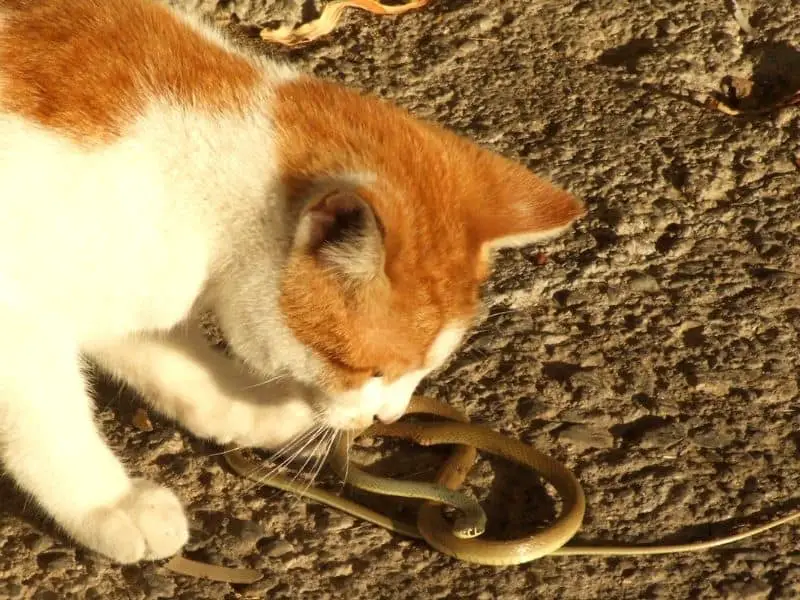
There are documented instances of cats and snakes becoming friends. However, in the beginning, it is better not to take chances, for the sake of the safety of both your feline and reptilian pets.
Keep pet cats and pet snakes separate from each other, at least until you have proven that they can be real and lasting friends.
Place the snake in a room that is cat-proof and never expose it to your cat at any time.
Why do some cats not hunt or attack snakes?
As previously mentioned, there are always exceptions to any rule. While both cats and dogs will generally attack a snake, this is not always the case.
Both cats and dogs have a wide range of individual personalities.
Some of them simply never attack anything. Being friendly to a snake may be a result of domestication or simply an individual preference.
Sources
- https://pets.thenest.com/cats-afraid-snakes-9609.html
- https://animalpath.org/do-cats-keep-snakes-away/
- https://libocsb.kku.ac.th/img/5192064j/article.php?900da4=can-cats-sense-snakes
Photo credit: ©canva.com
Medical Disclaimer: TheHomePestControl is a digital publisher and does not offer personal health or medical advice. The contents of this website are not intended to substitute for professional medical advice, diagnosis, or treatment.
Affiliate Disclaimer: As an Amazon Associate, I earn from qualifying purchases made on our website. If you make a purchase through links from this website, I may earn a commission at no additional cost to you.

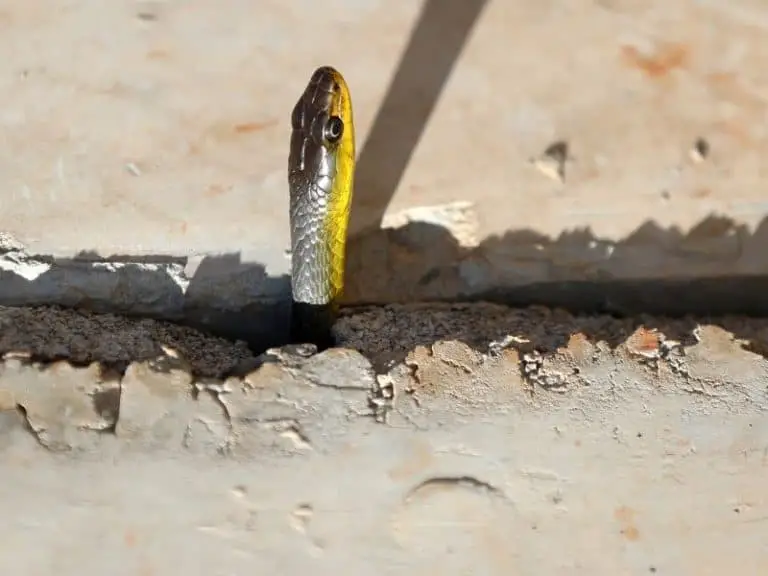
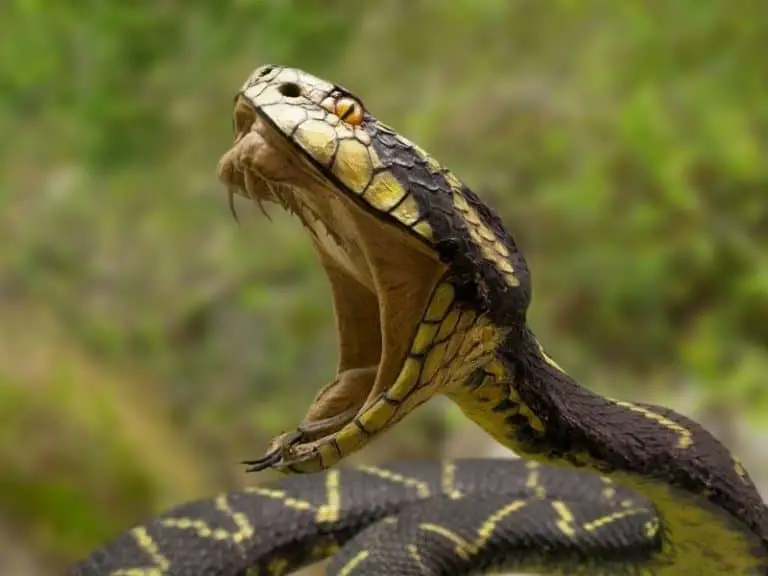
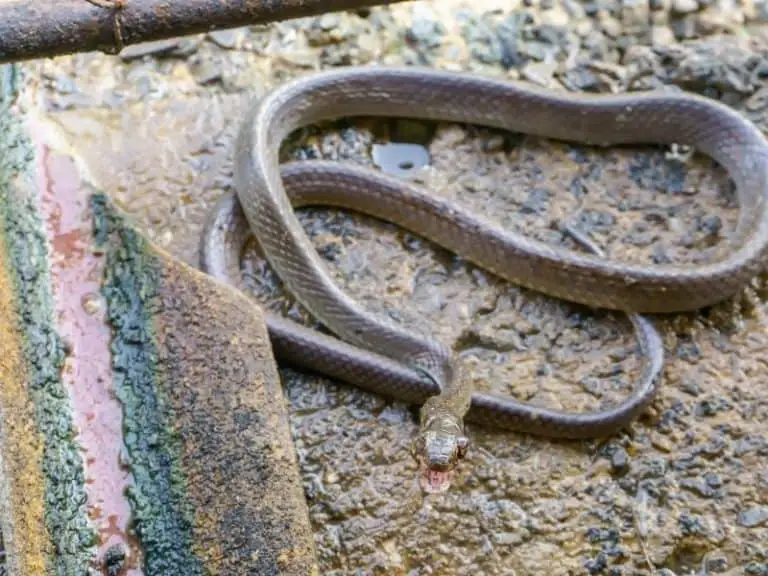
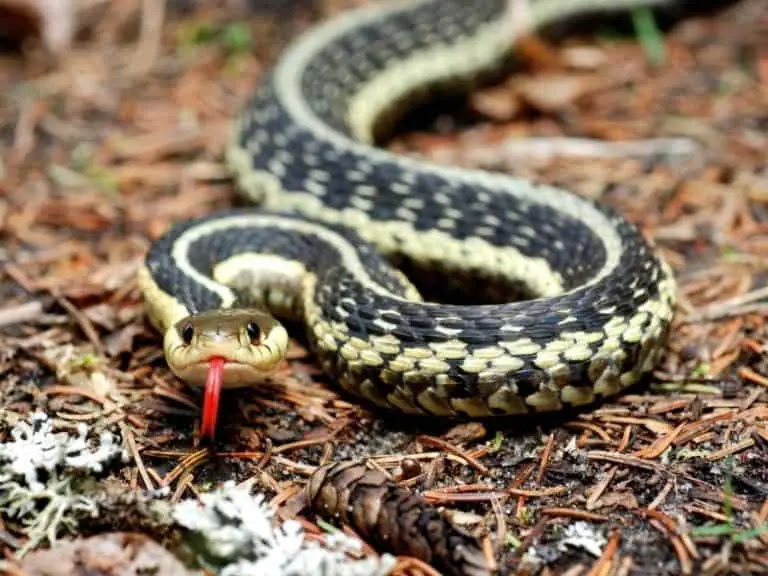

![Does Victor Snake-A-Way Work [Expert Opinion]](https://wypestcontrol.com/wp-content/uploads/victor-snake-away-768x576.jpg)